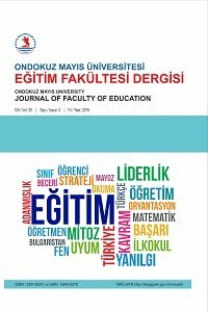ERGENLERİN SANAL ZORBALIKLARININ BAZI DEĞİŞKENLERE GÖRE İNCELENMESİ
Bu araştırmada ergenlerin sanal zorbalıklarının özanlayış düzeylerine, cinsiyete ve sınıf düzeyine göre incelenmesi amaçlanmıştır. Araştırma verileri, İstanbul'da liseye devam eden 169'u kız, 188'i erkek toplam 357 ergenden sağlanmıştır.Araştırmada ergenlerin sanal zorbalıklarını belirlemek amacıyla Arıcak, Kınay ve Tanrıkulu (2011) tarafından geliştirilen siber zorbalık ölçeği; özanlayış düzeylerini belirlemek amacıyla Türkçe'ye Deniz,Kesici ve Sümer tarafından uyarlanan özanlayış ölçeği kullanılmıştır.Araştırma sonucunda ergenlerin sanal zorbalıklarının özanlayış düzeylerine (F=.158, p>.05) ve sınıf düzeyine(F=2,350, p>.05) göre anlamlı düzeyde farklılaşmadığı,cinsiyete (t= -2,011, p
Anahtar Kelimeler:
Sanal Zorbalık, Ergenler, Özanlayış.
AN INVESTIGATION OF ADOLESCENTS’ CYBERBULLYING ACCORDING TO SOME VARIABLES
In this reseacrh, adolescents’ cyber-bullying was analysed according to self-compassion, gender and grade levels. Research data was obtained from 169 female, 188 male; totaly 357 adolescents who are curently high school students. In this research, to determine adolescents’ cyber-bullying “the scale of cyber-bullying” was used developed by Arıcak, Kınay ve Tanrıkulu (2011). To determine adolescents’ Self-compassion “the scale of Self-compassion” was used which was adapted to Turkish language by Deniz, Kesici and Sümer.According to research, adolescents’ cyber-bullying does not differ significantly according to self understanding level (F=.158, p>.05) and grade levels (F=2,350, p>.05). According to gender (t= -2,011, p
Keywords:
Cyberbullying, Adolescents, Self-compassion.,
___
- ALLEN A.B., LEARY M.R. (2010). “Self-compassion, Stress, and Coping”, Social and Personality Psychology Compass, 4, p. 107–118.
- ANG P.R., GOH D.H. (2010). “Cyberbullying among adolescents: The role of affective and cognitive empathy, and gender”, Child PsychiatryHum Dev, 41, p. 387–397
- ARICAK O.T. (2009). “Psychiatric Symptomatology as a Predictor of Cyberbullying Among University Students”, Eurasian Journal of Educational Research, 34, p. 167-184.
- ARICAK T., SİYAHHAN S., UZUNHASANOĞLU A., SARIBEYOĞLU S., ÇIPLAK S., YILMAZ N., MEMMEDOV C. (2008). “Cyberbullying Among Turkish Adolescents”, Cyberpsychology&Behavior, 11(3),p. 253-261.
- AYAS T., HORZUM M.B. (2011). “Exploring The Teachers’ Cyber Bullying Perception In Terms Of Various Variables”, International Online Journal of Educational Sciences, 3(2), p. 619-640.
- BORG M.G. (1999). “The Extent and Nature Of Bullying Among Primary and Secondary School Children”, Educational Research, 41(2), p. 137–53. Must afa P A M U K , Büny HORZUM M.B. (2011). “İlköğretim Öğrencilerinin Bilgisayar Oyunu Bağımlılık Düzeylerinin Çeşitli Değişkenlere Göre İncelenmesi”, Eğitim ve Bilim, 36(159), 56-68.
- KEITH S., MARTIN M.E. (2005). “Cyber-Bullying: Creating A Culture of Respect in A Cyber World”, Reclaiming Children and Youth, 13, p. 2242
- LENHART A., MADDEN M., HITLIN P. (2005). “Teens And Technology, Youth Are Leading the Transition to a Fully Wired and Mobile Nation”, Retrieved from http://www.pewinternet.org/Reports/2005/Teens-andTechnology. aspx.
- LI Q. (2006). “Cyberbullying In Schools: A Research Of Gender Differences" School Psychology International, 27(2), p. 157–170.
- İSKENDER M. (2009). “The Relationship between Self-Compassion, SelfEfficacy, and Control Belief about Learning in Turkish University Students”, Social Behavior and Personality, 37(5), p. 711-720.
- İSKENDER M., AKIN A. (2011). “Self-Compassion and Internet Addiction”, TOJET: The Turkish Online Journal of Educational Technology, 10(3), p. 215-2
- NEFF K.D. (2003a). “Self-Compassion: An Alternative Conceptualization of A Healthy Attitude toward Oneself”, Self and Identity, 2(2), 85-102.
- NEFF K. D. (2003b). “The Development And Validation Of A Scale To Measure Selfcompassion”, Self and Identity, 2(3), 223-250.
- NEFF K.D., HSIEH Y.P., DEJITTERAT K. (2005). “Self-Compassion, Achievement Goals, And Coping With Academic Failure”, Self and Identity, 4, p. 263 –287.
- NEFF K.D., RUDE S.S., KIRKPATRICK, K.L. (2007). “An Examination Of SelfCompassion In Relation To Positive Psychological Functioning And Personality Traits”, Journal of Research in Personality, 41, p. 908–916.
- NEFF K. D., VONK R. (2009). “Self-Compassion Versus Global Self-Esteem: Two Different Ways Of Relating To Oneself”, Journal of Personality, 77, p. 23–50.
- NEFF K.D. (2011). “Self-Compassion, Self-Esteem, And Well-Being”, Social and Personality Psychology Compass, 5(1), p. 1–12. Must afa P A M U K , Büny ER G E N L ER İN S A N A L Z O R B A LI K L A R IN IN B A Z I DE
- ISSN: 1300-302X
- Yayın Aralığı: Yılda 2 Sayı
- Başlangıç: 1986
- Yayıncı: Ondokuz Mayıs Üniversitesi Eğitim Fakültesi
Sayıdaki Diğer Makaleler
SOSYAL BİLGİLER ÖĞRETMENLERİNİN ÖĞRETİM ARAÇ-GEREÇ VE MATERYALLERİNİ KULLANMA DÜZEYLERİ
HOLLANDA VE TÜRKİYE’DEKİ FEN BİLGİSİ ÖĞRETMENİ YETİŞTİRME PROGRAMLARININ KARŞILAŞTIRILMASI
ERGENLERİN SANAL ZORBALIKLARININ BAZI DEĞİŞKENLERE GÖRE İNCELENMESİ
Alpaslan OKUR, Tuğba DEMİRTAŞ, Funda KESKİN
SİNANOĞLU’NUN ŞAKKU’L-KAMER MUCİZESİ HAKKINDAKİ MESNEVİSİ
ÖĞRETMENLERİN KARİYER GELİŞTİRMELERİNDE MÜDÜRLERİN LİDERLİK ROLÜNÜN İNCELENMESİ
ALGILANAN DUYGUSAL İSTİSMAR ÖLÇEĞİ (ADİÖ): GEÇERLİK VE GÜVENİRLİK ÇALIŞMASI
